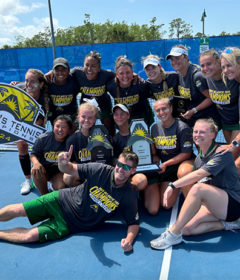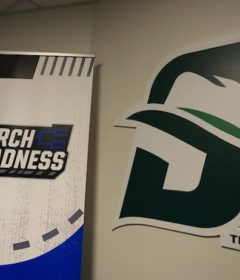Pandemic Doesn’t Slow Basketball’s Joel Kabimba
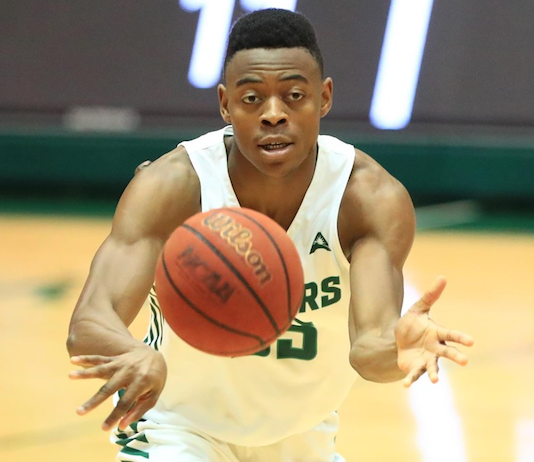
With teammates scattered across the country last spring as the initial fear of COVID-19 gripped the nation, Stetson’s Joel Kabimba never blinked. He simply put together a plan and went about his business.
The sophomore forward for the men’s basketball team spent most of the summer as a last man standing of sorts. Once students were allowed to return home in April to finish out the Spring 2020 semester, Kabimba and a small handful of teammates elected to stay behind in DeLand. But as soon as spring gave way to summer, Kabimba was a lone Hatter. Away from family. Away from his teammates. But never away from basketball. Or an impressive, self-motivated work ethic.
“As soon as the school transitioned to online learning pretty much everyone went home,” Kabimba said. “A couple of my teammates were still here but once the semester ended I was the only one left.”
A native of Kinshasa in the Democratic Republic of Congo, an impromptu trip home wasn’t realistic. Earlier in the year, he made plans to spend part of the summer with his sister in Bristol, Connecticut. But with Bristol’s proximity to New York City, then the epicenter of the pandemic, Kabimba later elected to remain in DeLand.
“My sister is the only close family that I have in the U.S.,” he said. “I was eager and excited to spend the summer with her. She’s the person I have the best chemistry with. It was devastating, but I made the best choice for me.”
A preplanned trip home for a few weeks at the end of the summer had to be scrapped as well. He was going to fly home at some point during the summer to see the rest of his family, but he wasn’t able to make it. “They ended up closing all the borders, so if I had flown home, I may have had a very difficult time getting out in order to return to the States. Staying in DeLand was the best option for me.”
With time on his hands and no teammates on campus, Kabimba didn’t sulk. He went to work.
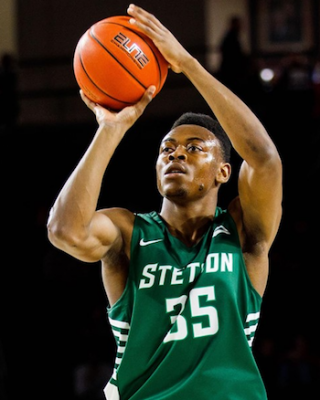
But how does one work out when gyms are closed, teammates are gone and campus athletic facilities have been shuddered?
“[Stetson strength coach] Spencer Phillips put together a great workout for all of us,” Kabimba explained. “I followed the plan the best I could even though the weight room was closed. I used the outdoor workout area behind the Wilson Athletic Center to help stay in shape.”
The sand pits behind the WAC served as a rudimentary workout area, complete with a pullup bar, and a glorified jungle gym.
“I did a lot of pullups,” he added with a chuckle. “The best thing you can do is pullups and dips. I really struggled in the beginning because that’s not how we normally work out. But I continued to work hard and eventually it began to help me. Lots of pushups in my room. Lots of things I can do myself.”
Kabimba says his background growing up in Kinshasa made it easier to prepare for the season on his own.
“Where I grew up we tried to make the best of everything, regardless of what we had or our personal circumstances,” he said. “When I needed to work on my game, I played on the courts by the fraternity houses. I shot a lot. I didn’t want to waste time sitting around. I tried to make the best out of the situation to try and improve and I think I did pretty well.
“I have a goal every day. And that’s ‘be better today than I was yesterday.’”
Part of improving means being honest about where you are as a player and attacking your weaknesses, even as you look to improve on your strengths. Kabimba took that to heart, engaging in serious film study with Stetson assistant coach Jonathan Mitchell.
“My main goals for improving were to work on my body and get more comfortable playing basketball,” Kabimba said. “One of my primary goals was to improve the things I wasn’t good at. I worked a lot with Coach Mitchell after the end of the season on what I needed to improve by watching film.”
Kabimba enjoyed a solid freshman season, averaging 5.4 points and 3.5 rebounds per game while making 25 starts as Stetson finished third in the ASUN Conference. He is one of five returning starters as the Hatters look to continue their resurgence under second-year head coach Donnie Jones.
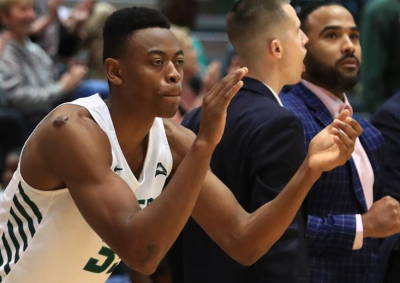
Jones isn’t the least bit surprised at how Kabimba thrived during difficult circumstances.
“Joel is very disciplined, very dependable,” Jones said. “He has great personal leadership skills and the discipline to be able to do not only do what we ask, but most of the time he’s already done it before we ask. His growth doesn’t surprise me at all. He’s going to do what you want him to do — plus more — once you show him what you expect. Even during the time when he couldn’t get in the weight room he was eating properly, doing pushups, running, and staying in great shape.”
Motivation was never much of a factor for Kabimba, even during his loneliest days. His parents are responsible for that trait.
“My self-motivation comes mainly from my parents and my family in general,” he said. “My parents are smart, successful people but they are also hardworking. Seeing the results of that work when you’re growing up is very motivating. When you see them every day and see the work they have done to get where they are, that motivates you. It makes you want to always do better.”
Calling Kabimba a self-starter may be a bit of an understatement.
His words: “I don’t want somebody else to tell me what I have to do. I want to figure that out for myself. When you work to get better, people notice and they’re more willing to help you improve. That’s my mindset. I’ve been that way for as long as I can remember.”
-By Cris Belvin

